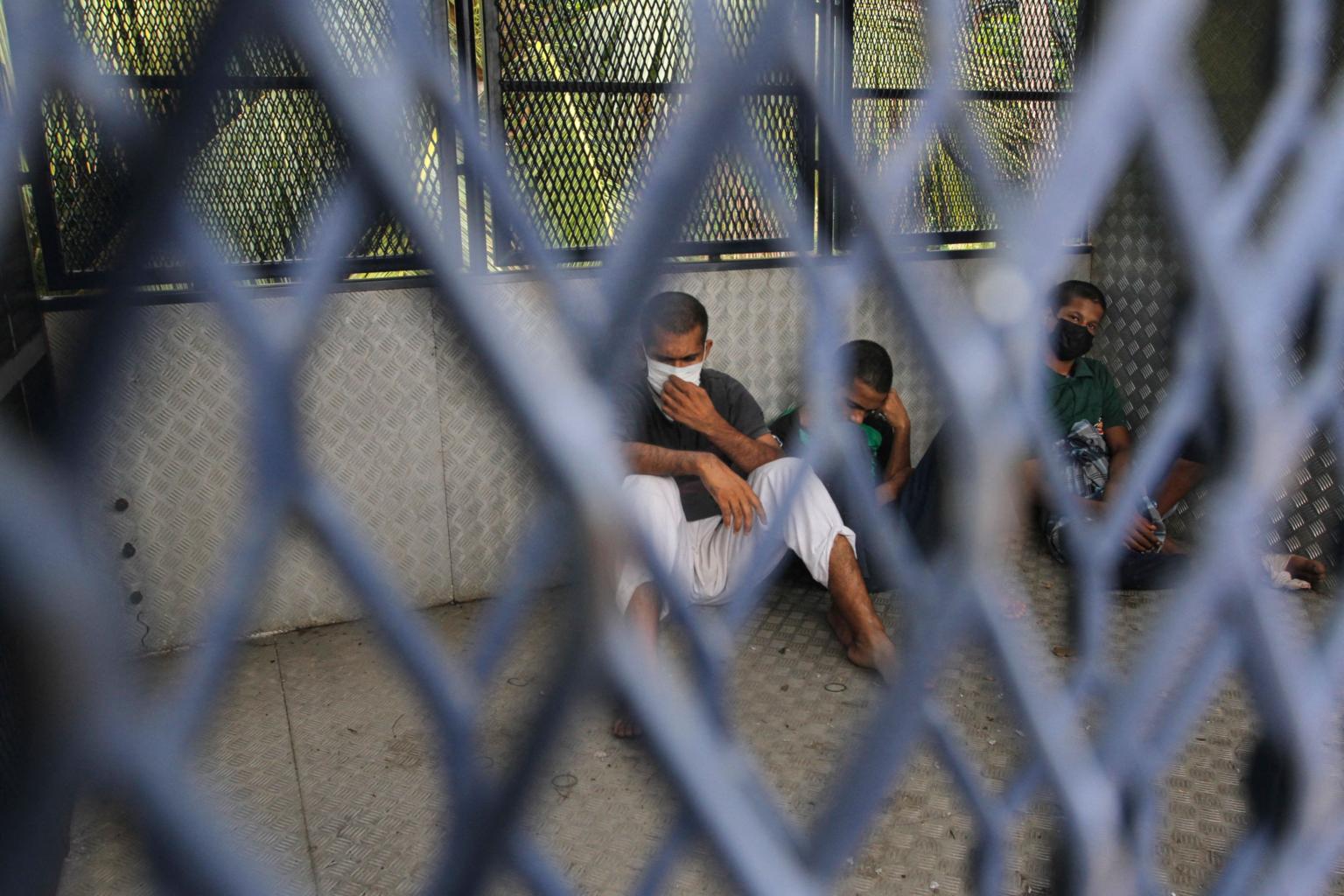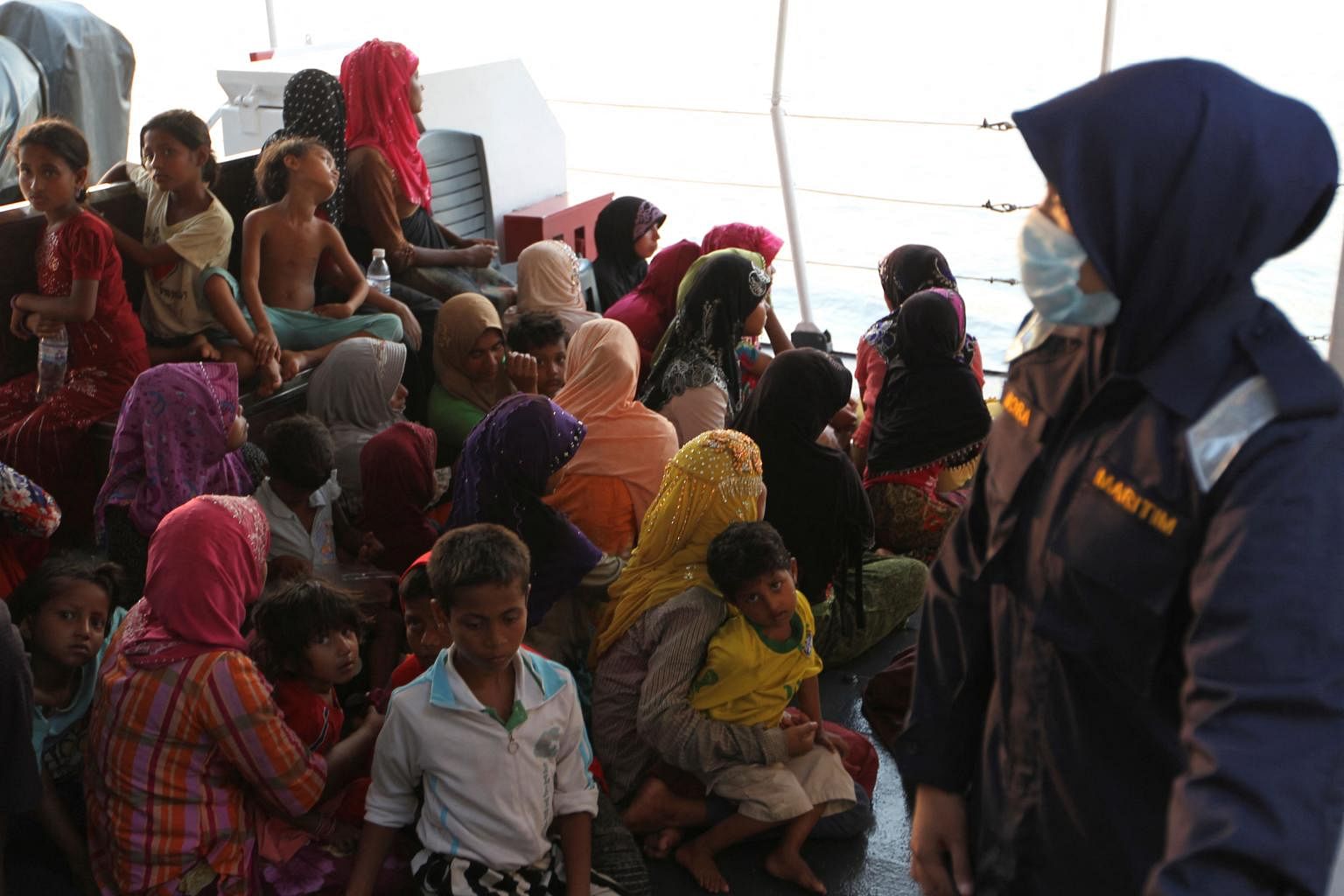Malaysia on potential collision course with UN body over refugee system
Sign up now: Get insights on the biggest stories in Malaysia

Rohingya migrants sit in a Malaysian Immigration truck after being recaptured in Penang on April 20, 2022.
PHOTO: AFP
KUALA LUMPUR - Malaysian authorities have mooted establishing the country's own refugee registration system, possibly setting it on a collision course with United Nations High Commissioner for Refugees (UNHCR).
This comes as the country continues its hardline response to a riot and breakout at a Rohingya refugee detention centre in Penang a fortnight ago.
Home Minister Hamzah Zainudin said on April 29 that Malaysia should be the one determining the eligibility of any refugee to temporarily stay in the country, a move that would duplicate efforts by UNHCR, which issues cards to enable refugees to live in Malaysia while awaiting resettlement.
Mr Hamzah said that Rohingya refugees - who are the biggest refugee group in Malaysia - were getting UNHCR cards "easily".
The Straits Times, however, understands that the average waiting time for an UNHCR card for refugees of any nationality could run up to five years.
UNHCR had not responded to ST's request for comment at the time of writing.
Malaysia, which does not formally recognise refugees, has been dealing with an influx of Rohingya, a group of stateless people fleeing sectarian violence in Myanmar, since 2015.
Over 100,000 Rohingya live in the country using UNHCR cards while awaiting resettlement. They are not allowed to work and have limited access to healthcare and education. Thousands more are believed to be in detention centres, some held for years. Over 500 Rohingya who broke out of the Penang camp on April 20 had been in detention for over two years.
The influx of Rohingya refugees has challenged Malaysia's previously soft approach towards refugees, leading to a more hardline approach.
Despite facing criticism for its prolonged detention of refugees and overcrowding at detention centres, the government had reacted by aiming at UNHCR's perceived role in Malaysia's refugee crisis.
If the government proceeds with the proposal by Mr Hamzah, it is unclear if the new registration system will replace an existing one set up nearly five years ago, or add another layer of duplication
My Refugee Centre (MyRC) was established in 2017 to register refugees who have UNHCR cards with the purpose of keeping track of the undocumented refugee population. It remains active today.
However, activists and a parliamentary group on refugees have been critical of the proposal.
"If we want to play the role of issuing cards for refugees, we should just sign the (UN Refugee) Convention," said Mr Adrian Pereira, executive director at the North South Initiative (NSI), a human rights-focused civil society organisation.Malaysia is not a signatory of the convention, and treats all refugees as illegal migrants.
Mr Adrian said that the government's move could be "dangerous", as it would merely add another layer of bureaucracy for refugees and do little to solve the multitude of social problems that they are facing.

"Until now, there is still no independent investigation on what happened at the detention centre (in Penang)," Mr Adrian said.
Mr Ahmad Tarmizi Sulaiman - an MP who leads the parliamentary group on refugee issues - on May 1 urged the government to resolve its differences with UNHCR before issuing its own cards.
"How will this affect our relationship with the UN?" he was quoted as saying by news portal Malaysiakini. Mr Ahmad and the home minister are part of the Perikatan Nasional coalition.
Various activists and organisations have already called for the government to seek a more holistic solution - mainly by issuing the refugees the right to work in Malaysia.
A week after the riot, the Malaysian Employers Federation urged the government to grant refugees special permission to work in order to ease Malaysia's labour shortage, largely caused by a lack of foreign workers following multiple Covid-19 lockdowns.
As the Rohingya are a stateless group, Malaysia is unable to deport them, while it takes years for UNHCR to successfully resettle them in another country. The UN body is understood to have resettled more than two dozen families this year alone, but this still pales in comparison to the tens of thousands of families awaiting resettlement and those still coming into Malaysia.
Malaysia has the fourth largest population of Rohingya outside of Myanmar.


